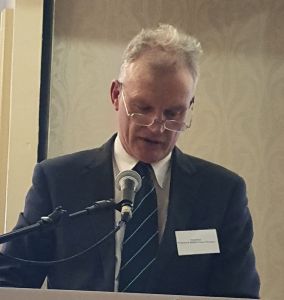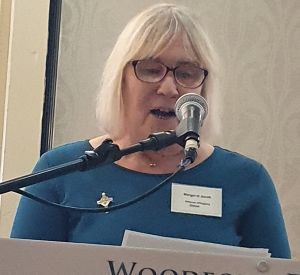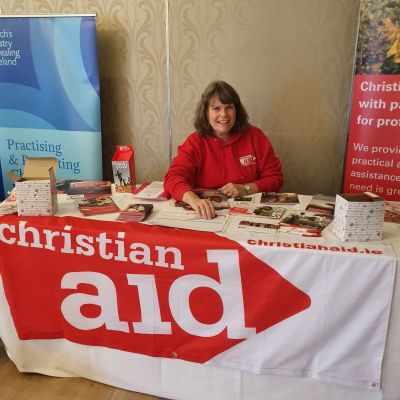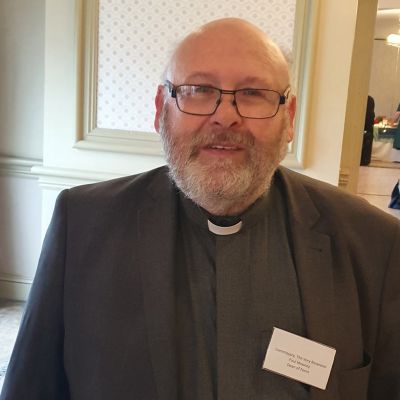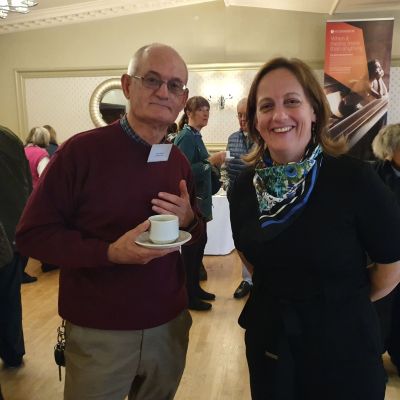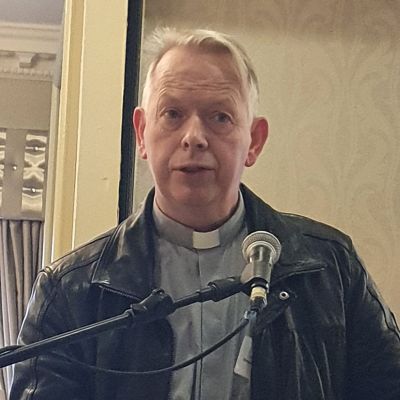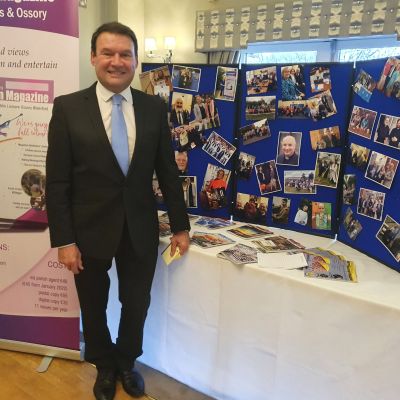It was good to be back having a normal Synod. That was the overall view as the 2022 Synod of the Church of Ireland Diocese of Cashel, Ferns & Ossory commenced in the Woodford Dolmen Hotel in Carlow on Wednesday, October 19th last. No more ‘winter coats in a chilly church’ like last year but masks were still somewhat in evidence given that Covid is still prevalent.
In his Presidential address Archbishop’s Commissary, The Venerable Paul Mooney, Dean of Ferns, who took on this role after Archdeacon Ruth Elmes’ illness, spoke of how, this time last year, no one could have imagined the vacancy that occurred in our diocese when Bishop Michael Burrows translated to the Diocese of Tuam, Limerick and Killaloe.
He went on to pay tribute to Archdeacon Ruth Elmes for all her work as Commissary and to also Archdeacon Bob Gray and Diocesan Secretary Elizabeth Keyes for all the work they’ve done during the Episcopal vacancy.
He then read out a message from Archdeacon Elmes who expressed her regret at not being able to attend Synod ‘on the brink of a new Episcopacy and a new chapter for our united diocese’. She went on to thank her clergy colleagues, Dean Paul Mooney for stepping in at short notice and Diocesan staff, particularly Elizabeth Keyes, for all her behind-the-scenes work preparing for Synod.
She also thanked everyone involved with running the Church of Ireland stand at the recent National Ploughing Championships.
As Commissary, she said, she had ‘privileged access to the working of (the diocese of) CFO’ and saw how so many people, by volunteering and working together ‘are part of Christ’s witness.’
Audio clips of hymns sung during the Synod Eucharist
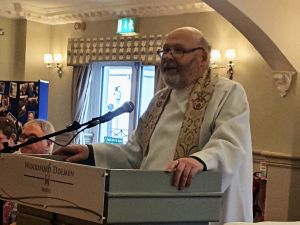 Dean Mooney also read out a message from our Bishop-Elect Archdeacon Adrian Wilkinson in which he said he looked forward to being with us all in the near future and getting to know the Church of Ireland in a diocese which played such an important part in his spiritual journey and formation.
Dean Mooney also read out a message from our Bishop-Elect Archdeacon Adrian Wilkinson in which he said he looked forward to being with us all in the near future and getting to know the Church of Ireland in a diocese which played such an important part in his spiritual journey and formation.
He pointed out that last Sunday’s collect spoke of new beginnings and onward journeys.
“May God guide you all in your work that you do today, as we continue to journey as a pilgrim people of God,” he said.
Dean Mooney, in his own address, spoke of how we were meeting at a time of transition and of how we also await the conclusion of the work of the Diocesan Review Commission in 2023.
“We also meet in a time of war in Ukraine, of continuing Covid, of pressures in the health sector and increasing difficulties in housing and rising costs for farms, businesses and families across our United Dioceses,” he said.
He went on to point out that this winter may seriously impact many of our most vulnerable parishioners and he welcomed Protestant Aid to the Synod.
He also acknowledged the work done by our own Diocesan charities and organisations as well as the role played by the Society of St Vincent de Paul in helping alleviate real need that often goes unseen.
Despite the period of transition the Diocese is going through ‘we have our role to play here today in maintaining our United Dioceses’, he said, ‘while preparing for and looking forward to a new chapter in our life in the fellowship, mission and ministry of God’s church.
After the minutes of the previous Synod were signed, an assessor appointed and communications from the House of Bishops or the General Synod were laid on the table Ms Hazel Corrigan was elected as a lay member of this Synod to serve on the Representative Body of the Church of Ireland for three years.
A clerical vote to create a supplementalist list for clerical members on Diocesan Council in the last year of Diocesan Triennial also took place during the Synod.
The Reverend Trevor Sargent then proposed the adoption of the Report of Diocesan Council.
The past year has been quite exceptional in his experience, he said.
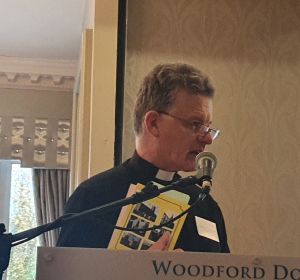 “The resilience of many parishes has been tested, having been fuelled by deep wells of faith and often innovative resourcefulness, in the face of Covid, an episcopal vacancy, staff shortages in the Diocesan Office… not to mention several parish vacancies and ever heavier demands on lay readers and retired clergy.”
“The resilience of many parishes has been tested, having been fuelled by deep wells of faith and often innovative resourcefulness, in the face of Covid, an episcopal vacancy, staff shortages in the Diocesan Office… not to mention several parish vacancies and ever heavier demands on lay readers and retired clergy.”
Highlighting many aspects of the Book of Reports he said that the financial trend in the diocese is not good news.
Parish contributions in 2020 were €2,187,310, but had decreased to €1,885,821 in 2021.
“Even taking account of Covid constraints, this is a trend that has to be reversed for our collective viability,” he said.
He went on to mention the work of the Diocesan Review Commission and Charities legislation where the audit threshold of €100,000 is still a concern to this Diocese, given the extra costs for a parish to have accounts above this amount audited.
“However, the greater challenge goes beyond the €100,000 audit threshold,” he went on. “It is the 100,000 children and young adults we have seen baptised down the years who we seldom if ever see in church on a Sunday morning. Yesterday, in the Bible readings for St Luke’s Day, Jesus tells us in the Gospel, “The harvest is plentiful, but the labourers are few; therefore ask the Lord of the harvest to send our labourers into his harvest”. (Luke 10: 2).
From what he can see, he said, in sporting organisations on a Sunday morning, ‘much of the ‘harvest’, whatever about the ‘labourers’, are on the pitch or watching from the side-lines.’
He pointed out when churches in England faced a similar conundrum in the past they set up their own football clubs such as Everton, Manchester City and Southampton, making sure their activities happened on a Saturday, and not clashing with Sunday worship.
“How should today’s church respond to the abandonment of weekly worship by many young families?” he asked.
“Colleagues such as Revd Canon Nicola Halford, Emma Purser, and others do amazing work with young people, but this Diocese has nobody employed full-time to make the Gospel an important matter to our young people.”
The widespread interest of our young people in the Green Schools Programme should be a reminder to our parishes that unless we are seen to be interested and part of
the solution to the climate crisis, young people will see the church as increasingly irrelevant.”
Praising the now all-colour Diocesan Magazine he encouraged parishioners to recommend it to others and give subscriptions as Christmas presents.
He also praised the work of the Glebes and Properties Committees, the Diocesan Guild of Lay Readers and their leader Dean Tom Gordon, the Mothers’ Union for their work, also the GFS and Bishops’ Appeal and Protestant Aid.
He heartily proposed the report to Synod, saying that the individual reports are reflecting a huge amount of good will, generosity of time and spirit, and in these challenging times of ‘cost of living crises’, they demonstrate the many gifts within the Church of Ireland in this United Diocese of Cashel, Ferns and Ossory, ‘gifts which nurture our local parish communities to be a light in dark times, and a living witness to love of Jesus Christ in the world.’
The report was seconded by Ms Ruth Kennington and adopted by Council.
A motion to create the Portlaoise & Ballyfin Group of Parishes was next on the agenda. David Kerr presented the motion and following an amendment, the motion was agreed unanimously by Council.
David Kerr who presented the motion
Standing Orders were suspended next so that the Church Missionary Society of Ireland’s co-ordinator The Reverend Roger Thompson could give an interesting presentation on the organisation’s work in East Africa and Tanzania.
The Boards of Education reports were presented next and considered in a single debate.
Ms Margaret Jacob introduced them and highlighted the challenges that have faced principals in the diocese over the past year including a shortage of substitute teachers and SNAs. She also spoke of the challenges of teaching, without support, children who have very little English and of the increase, since the pandemic began, in children presenting with anxiety, mental health, social skills, attention span and behavioural problems.
Ms Jacob thanked teachers for the time, energy and commitment they put into educating the primary and secondary school children in this diocese.
Ms Margaret Jacob
The Reverend Alex Morahan then gave a detailed address about education in Kilkenny College and while he spoke of how ‘life is difficult’ and about the sadness that has occurred there in the past year with the death of three pupils, a teacher and a valued member of the administrative staff during that period he also itemised the many activities available for pupils in KCK and wished former principal, Mr Simon Thompson, well in his new job in Geneva. He also complimented the acting principal and wished the new principal well, whoever that might be.
Canon Patrick Harvey then presented the Report of the Diocesan Board of Religious Education and spoke of how children’s choral festivals had been held in parishes rather than at a collective venue last summer and that this approach had worked.
While great praise was given to the work of Diocesan Readers at various times during Synod and discussions were had about readers’ expenses unfortunately Dean Tom Gordon was unable to present the report of the Guild of Diocesan Readers as he was called away for pastoral care reasons.
Bishop Denis Nulty, Roman Catholic Bishop of Kildare and Leighlin, who was a guest at Synod, was then invited to speak. He thanked Dean Mooney for the invitation and pointed out that his church is now going down the synodical route.
“The Synod process is a bit like an Irish stew,” he said. “It has everything in it but in the end you get the truth.”
He enjoyed visiting the Church of Ireland Ploughing tent, he said, and is looking forward to meeting our new Bishop.
Before the break for refreshments Canon Nicola Halford presented her Youth Report and drew attention to the need for a Youth co-ordinator in this diocese and for more funding to be committed to youth events.
She concluded by showing a Power Point presentation related to the very successful Summer Youth Camp held in Gurteen College in July. There are plans to extend the camp next year to a weekend for 4th-6th class pupils as well as the Mon-Fri camp for teens.
Lesley Bayley, Diocesan MU president told Synod that they run two grant systems including a re-imagined Away From It All (AFIA) grant. She pointed out that AFIA will subsidise any child who needs it to go to a camp or other youth event. She also said that they run a uniform and schoolbook bursary too which can be applied for at any time of the year at cfoafia@gmail.com Any member of clergy, any MU member or any teacher can apply on a person’s behalf.
Standing Orders were again suspended briefly in order for the Magazine Editor and Diocesan Communications Officer, Ms Margaret Hawkins to address Synod. She spoke of the importance of encouraging people to subscribe to the Magazine and of the ‘hybrid year of flux’ that 2021/22 has been for the dioceses with vacancies and people trying to settle back into normality. She concluded by bringing up the topic of change and its possibilities and potential with a poem entitled Pews On Wheels.
A short report on behalf of the Diocesan Review Commission followed, presented by Ms Linda Rainsberry who thanked all those who had assisted with the work of the Commission and said that its report would be presented at a Special Synod early in 2023. She also thanked the Finance Committee and Ecclesiastical Insurance for funding towards paying a professional research consultant to analyse the data.
The work of Bishops’ Appeal was related by Ms Gillian Purser who spoke of the transformation that BA-funded MU projects has made possible for women in Africa and hoped that our diocese of CFO would continue to hold onto the ‘biggest contributor to Bishops’ Appeal’ crown that it has held for many years due to our former bishop’s peregrinations.
Lesley Bayley added some more detail about the work of the Mothers’ Union in Ireland, of knitting hats for premature babies, of renewed links with and donations to the Midlands Prison, how AFIA grants have helped Ukrainian families in the diocese and about how cost of living grants are available from MU thanks to the three-yearly Mums In May funding.
Geoff Scargill of Protestant Aid was then invited to address Synod and he asked clergy to look out, particularly, for vulnerable older people who have heating problems this winter. He thanked those who support Protestant Aid so that many people can be helped each year.
Synod concluded then with the Blessing which was followed by Ms Hazel Corrigan thanking Dean Mooney for chairing the Synod and giving special words of thanks to Diocesan Secretary, Ms Elizabeth Keyes who worked so hard preparing for the event.
Stands at the Synod included Bishops’ Appeal, Protestant Aid, Christian Aid, Church Missionary Society, Ecclesiastical Insurance, Mothers’ Union, Church Ministry of Healing and the Diocesan Communications & Magazine Committee stand.
A sum of €620 was collected for Bishops’ Appeal at the event.
The Service of the Eucharist was organised by Dean Tom Gordon who led the music which included the Taize chant Laudate Omnes Gentes, also Gloria in Excelsis and the hymns Lord Jesus You have come to us and We Plough the fields and scatter.
Some other photos from Synod

